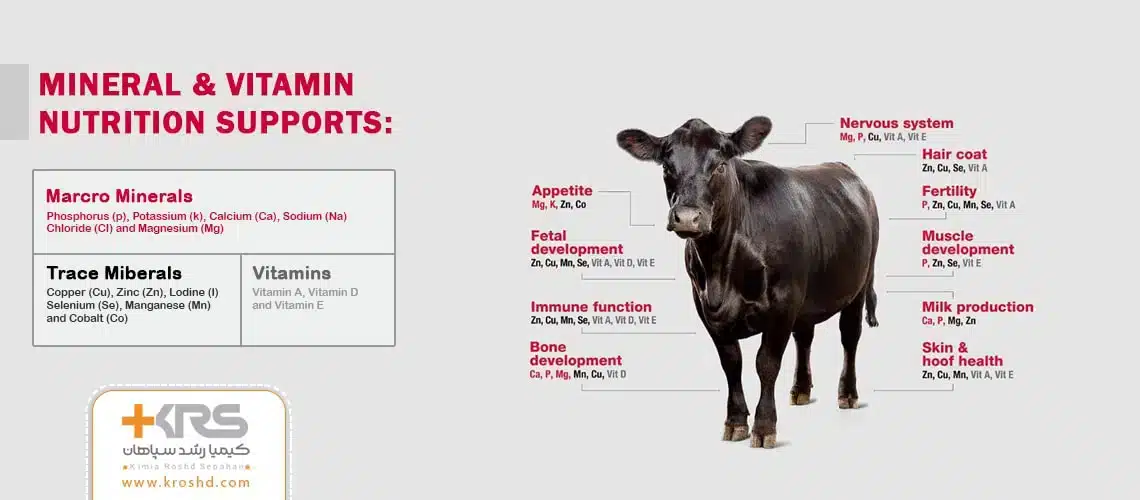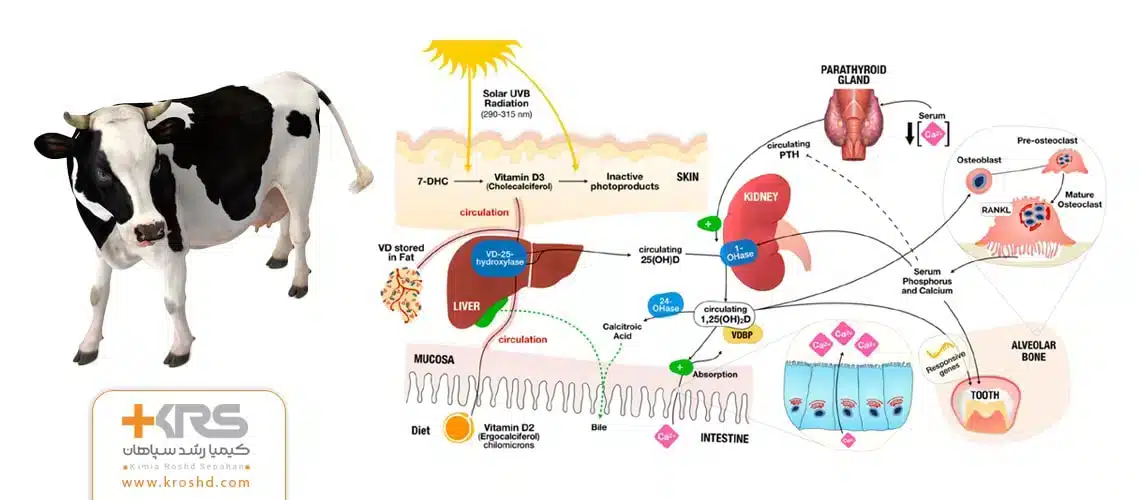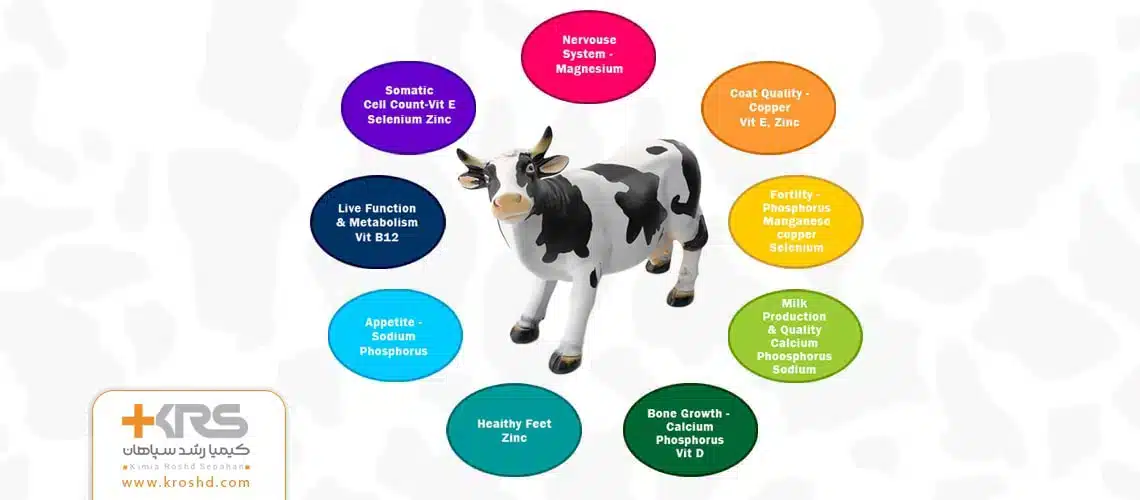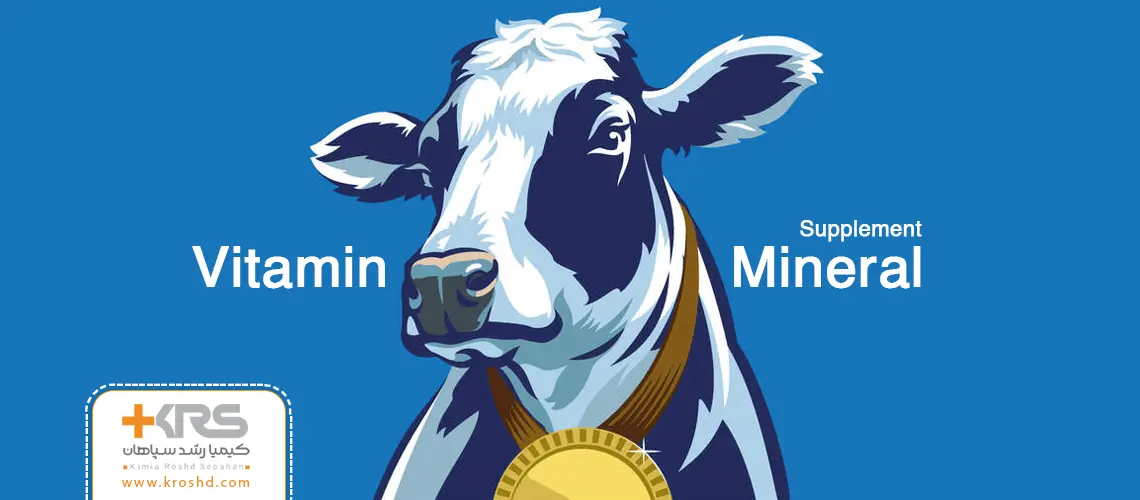livestock vitamin and mineral supplement
The consumption of vitamin and mineral supplements is necessary as a management tool to support high production levels and improve reproductive performance and the immune system, but unfortunately, due to the low volume of consumption, livestock vitamin and mineral supplement often neglected in diet regulation. In addition to increasing production and reproduction efficiency, they reduce unjustified costs of current rations.

vitamin supplement
Vitamins are essential nutrients that are used in small amounts for the normal functioning of body cells. Some of them are found in animal feed and some are made in tissue or by rumen microbes. So far, 14 vitamins have been identified in nature. All of which are not necessary for animals. Vitamins are divided into two groups; water-soluble (B, C) and fat-soluble (A, D, E, K). Each group has different roles in the body.

The regulatory role of livestock vitamin supplements in gene expression
Human genome science researchers have shown that nutrients and biologically active components of foods, including livestock vitamin and mineral supplement, affect the expression of genes over time. They cause chemical genetic changes that can be seen in the phenotype. Some of the vitamins, including vitamin A, is one of the essential nutrients that are involved in gene expression by nuclear receptors. It was proven that expression of the encoding genes of – beta-defensin anti-microbial peptides after calving is related to the consumption of vitamin D in the pre-calving period.
The metabolic role of livestock vitamin supplement
Vitamin B play a very important role in energy metabolism and the ruminal microbial activity of ruminants. For example, vitamin B1 acts as a cofactor in the Krebs cycle. and vitamin B2 act as a coenzyme of Flavin Adenine Nucleotide and Flavin Mono Nucleotide in oxidative reactions. Vitamin B3 as a coenzyme of Nicotine Amide Di Nucleotide (NAD) plays a role in the process of glycolysis and the Krebs cycle. Vitamin B5 is a part of the structure of Coenzyme A. Vitamin B5 is a part of the structure of Coenzyme A.
Vitamin B6 acts as a cofactor in protein metabolism, amino acid synthesis, and protein hydrolysis. Vitamin B8 is a coenzyme of carboxylase enzymes. Vitamin B9 participates in the transfer of the carbon unit in the synthesis of purine, pyrimidine, and methionine. Vitamin B12 is a part of Maloney CoA Mutase in the Krebs cycle. Choline acts as a pseudo vitamin and a part of the phospholipids of the body’s cell membranes. The use of high-quality vitamins in the production of livestock vitamin and mineral supplement improves the performance of animals by improving metabolic processes.
The role of improving the immune system of livestock vitamin supplement
Both groups of water-soluble and fat-soluble vitamins strengthen immune responses and the overall functioning of immune systems in different ways. For example, vitamins C and E protect the body against oxidative stress by trapping free radicals. vitamin A improves the function of the immune system by increasing the body’s anti-inflammatory responses. Vitamin B6 in livestock vitamin and mineral supplements, improves the function of white blood cells in the face of infection by participating in the synthesis of a protein called interleukin.
The necessity of using a livestock vitamin supplement
Successive droughts have decreased the quantity and quality of green fodder in livestock rations, and increased the incidence of infectious diseases, especially in newborn calves. For this reason, it is necessary to use livestock vitamin supplements including, A, Niacin, biotin, etc.
Mineral supplement
Mineral elements are included in 5% of the animal’s body weight. Out of about 90 elements found in nature, 24 elements have been introduced as necessary to maintain the survival of animals. In addition to their important role in the feeding system of animals, minerals have structural, catalysis, physiological, and regulatory.
roles Mineral elements are divided into two groups based on the amount of their consumption in the body:
- Macro minerals (high consumption) such as calcium, phosphorus, magnesium, sodium, chlorine, potassium, sulfur, etc., usually concentrate more than 100 ppm in the diet.
- Micro minerals (low consumption): such as copper, zinc, manganese, iron, cobalt, iodine, selenium, chromium, boron, fluorine, arsenic, nickel, and vanadium usually concentrate less than 100 ppm in the diet.livestock vitamin and mineral supplement, usually include both groups of low consumption and high consumption elements depending on the conditions of the herd.
The necessity of using mineral supplement
Research has shown that the dry fodder consumed in many farms is deficient in copper, cobalt, zinc, selenium, and to some extent, manganese and iodine. This deficiency during calving causes disturbance in the animal’s metabolism, a decrease in milk production, an increase in the incidence of retained placenta and abruption, an increase in susceptibility to metabolic diseases, and an increase in mortality in calves, so their use as a supplement is recommended for all livestock.

Mineral important roles include:
- The structural role of livestock mineral supplement
- The role of gene regulation of mineral supplement
- The catalytic role of mineral supplement
- The physiological role of mineral supplement
The structural role of livestock mineral supplement
The Some of the minerals are the structural components of the tissue of the body’s different organs. For example, calcium, phosphorus, selenium, and magnesium are important in the formation and health of teeth. and bones. Sulfur is a part of the proteins that make up muscles. Zinc and phosphorus are parts of the nucleus and cytoplasm of cells. Manganese is a factor in the construction of mucopolysaccharides making the bone.
The role of gene regulation of mineral supplement
The role of minerals in the differentiation and proliferation of cells is very important. For example, calcium transmits nerve messages. Selenium in Seleno- Cysteine is involved in gene transcription as amino acid 21. Zinc is a part of the structure of the insulin molecule, and plays role in regulating blood sugar.
The catalytic role of mineral supplement
Minerals can play a strong catalytic role in the endocrine system and enzymes. They act as structural components of coenzymes, hormones, and metaloenzymes. Their function can be anabolic, catabolic, oxidative, and antioxidant. For example, calcium in the metabolism of carbohydrates, fats, and proteins, and manganese in cells’ mitochondria plays a catalytic role.
The physiological role of mineral supplement
Mineral elements in vitamin and mineral supplements as an electrolyte play a role in maintaining osmotic pressure, acid and base balance, mutual activities between nerves and nerve signals, and membrane permeability. Cerebrospinal fluid function. is dependent on the presence of elements such as sodium, calcium, magnesium, potassium, and chlorine in the blood. It was proven in research that increasing chromium supplement to the dairy cattle diet, prevents the occurrence of fatty liver and ketosis .by increasing insulin sensitivity.
The recommended proportion for micro minerals
| Elements1 | Element 2 | 1/2 ratio |
|---|---|---|
| Zn | Cu | 4/1 |
| Zn | Mg | 1/1 |
| Cu | Mo | 6/1 |
| Fe | Cu | 40/1 |
What is the best livestock supplement?
- It is the most economical livestock supplement in the market.
- Its ingredients are combined based on the assessed needs and problems of the herd (based on the results of the soil and water test, the season, and the history of diseases in the herd, etc.).
- It contains flavorings and other useful ingredients and they are actually tasty.
- It is easy to digest.
- It does not contain harmful bacteria.
- It is completely hygienically produced.
The price of animal vitamin and mineral supplements
How is the price of livestock vitamin and mineral supplement determined?
The price of livestock supplements usually is determined based on the formula and the amount of consumption (which is influenced by feeding management, storage conditions, herd age, and water quality), the quality of the materials, brand popularity, the type of packaging and the type the purchase (direct and indirect).
When buying a supplement, the producer must pay attention to the total cost of the supplement per head of livestock and the short-term and long-term profit from it (for example, increasing conception rate in dairy cattle and decreasing weaning day in calves).
How to make livestock vitamin and mineral supplements?
One of the most effective technologies in the livestock husbandry industry has been the production line of livestock supplement. Advances in genetics and breeding have created limitations in livestock performance. supplements produced with the best quality and with the most accuracy overcome these limitations to a large extent.
Features of the high-quality livestock supplement production line
- Raw materials: The most important and effective factor in the production of animal supplements is the quality of raw materials and their compounds
- Tanks: They are suitable in terms of volume, material, and slope
- Weighing systems uses very special weighing scales with the lowest error and is compatible with the PLC system.
- Premix mixers are made of steel and have the highest precision for producing a uniform product.
- Mixing mixers have different pedals with different lengths and angles and made product with the lowest cv.
Result
As mentioned above, the reduction in annual rainfall has decreased the quantity and quality of fodder consumed in livestock diets. The increase in the prevalence of infectious and metabolic diseases, especially in the sensitive period of transition, is one of the consequences in this weather situation. Therefore, it seems necessary to use livestock vitamin and mineral supplements for compensating deficiencies of high-concentrate rations.
FAQ: Frequently Asked Questions
Using livestock vitamin and mineral supplements is necessary as a management tool to support high production levels, and improve reproductive performance and the immune system.
- Reducing the economic costs of ration
- performance Increasing production and reproduction
- Increasing the longevity of livestock in the herd by improving the performance of the immune system
- Livestock vitamin and mineral supplement is prepared from high-quality raw materials.
- Weighing systems and mixers production line of livestock vitamin and mineral supplement should have the least possible error and cv.
- The company selling livestock vitamin and mineral supplement, provides the best packaging and after-sales service.
The price of livestock supplements usually is determined based on the formula and the amount of consumption the quality of the materials, brand popularity, the type of packaging and the type the purchase (direct and indirect).

